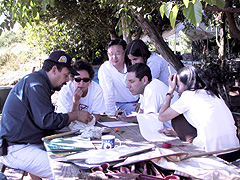|
July 21, 2003
International agroecology course draws global
participants
By Jennifer McNulty
With participants from Tunisia, Venezuela, Mexico, Korea, Vietnam, Italy,
Nigeria, Canada, and the United States, the International Agroecology
Short Course drew its most diverse group of participants ever this year.
|

|
| International visitors identify
insects at the UCSC Farm during an intensive two-week agroecology
course. Pictured from left to right are Felipe Pulido of Venezuela;
Janet Bryer, UCSC research assistant; Myung-Chul Seo of Korea; Olgaly
Ramos, a graduate student at Kansas State University; Ernesto Mendez,
a UCSC doctoral candidate; and Sen Hoang of Vietnam. Photo:
Ariane de Bremond. |
"One of the great benefits of this course is that we get together
with people from all over the world," said Stephen Gliessman, Alfred
E. Heller Professor of Agroecology in the Environmental Studies Department
at UC Santa Cruz, who developed the course five years ago. "I learn
as much from the participants as I try to teach them."
The short course
offers an intensive series of lectures, farm visits, demonstrations,
and seminars designed to provide a forum for researchers, government
representatives, farmers, and educators to share knowledge and build
an international network of those interested in promoting sustainable
agriculture.
This year’s course, from July 13 to 26, focused on interactions
between human and ecological communities in heterogeneous rural landscapes.
"There is an immense variety of agricultural communities and landscapes
in the world," said Gliessman. "We need to learn how agroecology
can reach them and help promote the transition to sustainability."
Samia Belkhiria, who administers Tunisia’s organic program, attended
the course because she felt her knowledge of broader agroecological
principles was weak. "Organic is just part of the system,"
said Belkhiria. "I needed more knowledge about other parts of agroecology,
not just organic."
Upon returning to Tunisia, Belkhiria will write a report about the
course for the Minister of Agriculture that will be distributed to everyone
in organic and sustainable agriculture. "It’s been very interesting,"
said Belkhiria. "I hope to send others to attend the course in
the future."
A delegation of five researchers and academics from Vietnam also attended
the course, with representatives coming from northern, central, and
southern Vietnam. Although ecology is a relatively new concept in Vietnam,
community-based resource management lies at the heart of the government’s
efforts to avoid deforestation, minimize soil erosion, and protect water
supplies, said Sen Hoang, a lecturer at Hue University of Agriculture
and Forestry.
Olgaly Ramos attended the course as a graduate student in entomology
at Kansas State University. For Ramos, the course was an opportunity
to broaden her perspective and take a "systems approach" to
agroecology.
"I started in biology, then specialized in biological control,
and now I’m focused only on insects that feed on wheat and corn
when they’re in storage," said Ramos. "I want to have
more variety and to learn about other areas."
After graduation, Ramos plans to return to her native Puerto Rico and
teach at the university level. "I want to try to talk them into
including courses on agroecology," she said.
Similarly, Roberta Castillo Martinez, a professor at the University
of Quintana Roo in Mexico, hopes to open an agroecology program on her
campus.
Laura Trujillo and Carlos Guadarrama (UCSC Ph.D. ’00), both professors
at the University of Chapingo in Mexico, studied as doctoral students
with Gliessman and returned to UCSC this summer as instructors.
The challenge facing agroecology today is the need for greater understanding
of the social forces at work, said Trujillo, whose expertise is in the
political ecology of coffee production in Mexico. The crash of coffee
prices a few years ago has highlighted the need for a focus on markets.
"Most people have experience producing organically--managing the
soil and the ecosystem," she said. "They want to understand
the social part of it, not the technical part. They want to know what
happened to the ideas about networks and unions, and they want to know
what is going to happen with the market for their products."
Indeed, the economic downturn in Mexico has wiped out many opportunities
and created enormous barriers on the path to sustainability, said Guadarrama.
"Ecology is trendy and in the news, but the reality is quite different,"
he said. "It’s a lot of trouble to push technological innovation
in agriculture. Students were just starting to get good jobs, and now
we’re in a depression. It’s so bad, there are no jobs for
anybody."
Twenty participants attended the course this summer; several received
financial support from the Ford Foundation. Next year’s course
will take place in Latin America, said Gliessman. In addition to Gliessman’s
agroecology research group, the course was organized by the UCSC Program
In Community and Agroecology (PICA), an on-campus living-learning residential
program centered in the Village on lower campus, and the Community and
Agroecology Network (CAN), a nonprofit based in Santa Cruz. More information
is available online.
Return to Front Page
|